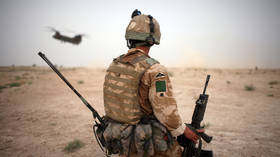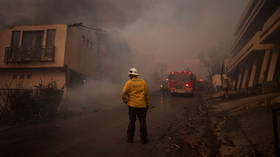Britain in doubt over Afghan strategy
British Prime Minister Gordon Brown has delivered a speech to defend the highly criticized Afghan campaign. This comes a day after a defense ministry aide resigned, rebuffing the government’s Afghan handling.
In a letter to Brown, Eric Joyce, the parliamentary private secretary to Defence Secretary Bob Ainsworth, called for setting a deadline for Britain’s military presence in Afghanistan, arguing that voters will not “accept for much longer that our losses can be justified by simply referring to the risk of greater terrorism on our streets.”
He also criticized British NATO allies in the contingent for a lack of effort in pursuing the mission:
“For many, Britain fights, Germany pays, France calculates, Italy avoids. If the United States values each of these approaches equally, they will end up shouldering the burden by themselves,” he wrote.
Joyce, the first key governmental figure to resign over Afghanistan, went on to lash out at the cabinet, saying British troops in Afghanistan were not given enough resources to do their job. “Labour must remember that service folk and their families are our people… and we must literally at all costs continue to show by our actions that we mean it,” the former army major said.
The death toll of Britons in Afghanistan reached 212 people on Thursday, with 41 killed in June and August alone.
On Friday, Brown has addressed this and other criticism over Afghanistan strategy.
Brown reiterated his commitment to stay in the troubled Middle Eastern country until its own security forces are ready to deal with the Taliban threat on their own.
“People ask what success in Afghanistan would look like. The answer is that we will have succeeded when our troops are coming home because the Afghans are doing the job themselves,” Brown has said, arguing that “when the security of our country is at stake, we cannot walk away.”
He also noted that the British contingent in Afghanistan is now better financed than a few years ago, with spending per soldier up from about $300,000-a-year in 2006 to almost $640,000 in 2009.
Joyce’s public stunt was badly timed and harmful, believes Pyotr Goncharov, military commentator from the radio station Golos Rossiy (Voice of Russia), especially since Britain is America’s best ally in the Afghan coalition.
“Taking into account the British national character, this story is bound to make a lot of ripples, especially if the Parliament backs the criticism,” he told RT. “I believe Joyce played on obvious things.”
Joyce put under question the efficiency of the new Allied strategy, especially since it “coincided with the speech of US Secretary of Defense Robert Gates, who said that this is the not the time to step down the effort in Afghanistan and that it was crucial to show that the new strategy was bringing fruit,” Goncharov commented.
The Western coalition has 100,000 troops stationed in Afghanistan at the moment. The British share is the second-largest after that of the US, making up approximately 9,000 troops.












